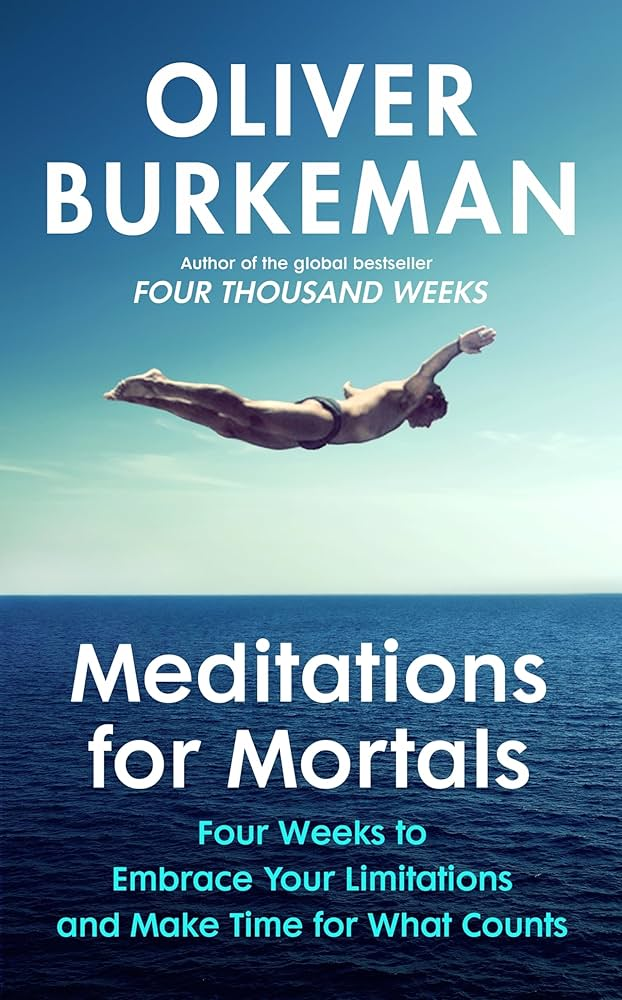- Tags:: 📚Books , Happiness
- Author:: Oliver Burkeman
- Liked:: 6
- Link:: https://www.amazon.es/Meditations-Mortals-embrace-limitations-counts/dp/1847927629
- Source date:: 2024-10-08
- Finished date:: 2024-10-26
- ISBN:: 978-1847927620
- Cover::

Why did I want to read it?
Four Thousand Weeks from Oliver Burkeman was one of those rare books who changed my life. I couldn’t let the next one slide.
What did I get out of it?
Interesting, but less transformative than Four Thousand Weeks. More practical perhaps, but with less original views on topics.
Against My Time Boxes:
But if you’ve done so, you’ve probably also discovered the perverse consequences of such interventions, which are a) that they tend to make interruptions and distractions feel worse, when they do happen; and b) that they cause more things to get defined as unwelcome interruptions in the first place. (…) Suppose (…) I’m focusing hard on my office at home when my son bursts in (…) A small moment of connection, the kind of thins life’s supposed to be about (…) his entrance is suddenly an intrusion (p. 114)
This makes A LOT of sense in the realm of Data Analysis (Data Team Vision And Mission). It could be seen as something against Driving Operational Clarity, but it is not (it’s being super flexible regarding where and when do we need clarity about something, which may change quickly):
As the Zen teacher John Tarrant explains, the way we talk about distraction implies something equally unhelpful: a model of the human mind according to which its default state is one of stability, steadiness and single-pointed focus. ‘Telling myself I’m distracted, he writes, is a way of yanking on the leash and struggling to get back to equilibrium.’ But the truth is that fixity of attention isn’t our baseline. The natural state of the mind is often for it to bounce gently around, usually remaining only loosely focused and receptive to new stimuli, the state sometimes known as ‘open awareness’, which neuroscientific research has shown is associated with incubating creativity. (p. 116)
The signature behaviour of the operator-from-sanity, by contrast, is what the creativity coach Jessica Abel calls ‘paying yourself first with time’: spending a little time on what matters to you most immediately, instead of waiting, because you understand that even thirty minutes spent Actually Doing the Thing today are more valuable than hundreds of purely hypothetical hours in the future. (p. 129)
Just like the “bad ending” of The Good Place. If events were infinite, they would not be that valuable:
The transience is the whole point (p. 142)
Also for Data Team Vision And Mission:
Perhaps most radically of all, what additional satisfaction could you take in your life, what fun could you have, once you glimpse a truth that must have come intuitively to premodern people, which is that since life is so inherently confusing and precarious, then joy, if it’s ever to be found at all, is going to have to be found now, in the midst of the confusion and precariousness? (p.147)
Very sinilar to the arguments of Viktor Frankl in El Hombre En Busca De Sentido:
Instead, you get to pour yourself into tasks that matter for no other reason than that nothing could be more enlivening, or more true to the situation in which you find yourself. You get to proceed in the splendidly imperfectionist spirit of the eco-philosopher Derrick Jensen, who says: ‘The good thing about everything being so fucked up is that no matter where you look, there is great work to be done.’ (p. 158)